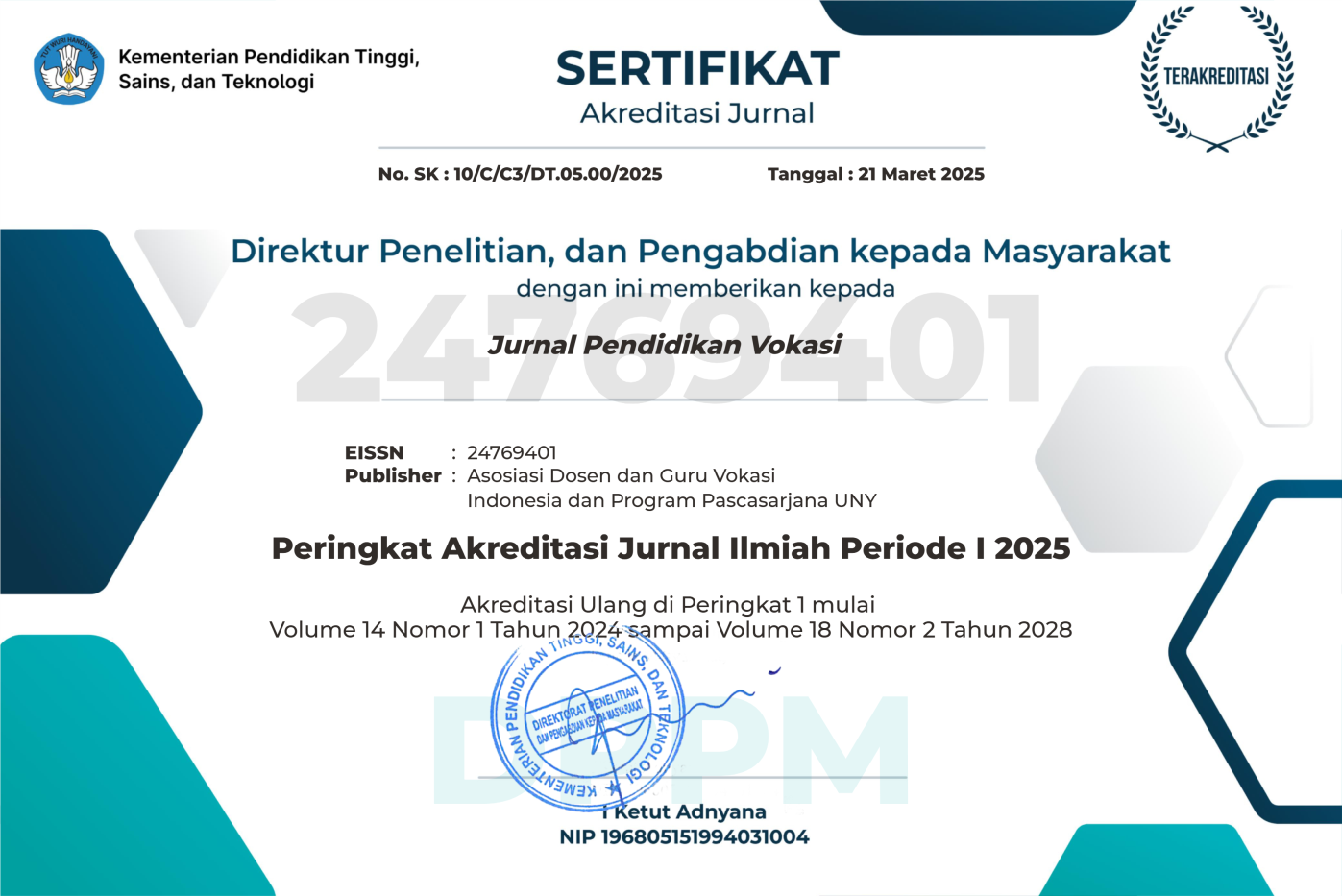Development of learning modules of basic electronics-based problem solving in Vocational Secondary School
DOI:
https://doi.org/10.21831/jpv.v7i2.12986Keywords:
learning outcomes, learning modules, problem solvingAbstract
References
Aflaha, D. S. I., Suparmi, S., & Sarwanto, S. (2015). Pengembangan Modul Fisika Berbasis Problem Solving Materi Elastisitas untuk Siswa Kelas X SMA/MA. Jurnal Inkuiri, 4(1), 63–72.
Anggraini, A., & Sukardi, S. (2015). Pengembangan Modul Prakarya dan Kewirausahaan Materi Pengolahan Berbasis Product Oriented bagi Peserta Didik SMK. Jurnal Pendidikan Vokasi, 5(3), 287–296.
Anggraini, F., & Sukardi, S. (2016). Pengembangan Modul Pembelajaran Kewirausahaan Model Student Company di SMK Negeri 1 Godean. Jurnal Pendidikan Vokasi, 6(1), 24–30.
Arend, R. I. (2014). Learning to Teach. Columbus: McGraww-Hill Higher Education.
Barnet, K., & Ryan, R. (2005). Vocational education and training in Australian schools: Issues for practitioners. International Education Journal, 5(5), 89–104.
Berg, G. A. (2002). Why Distance Learning? Higher Education Administrative Practices. ACE/Praeger Series on Higher Education. Greenwood Publishing Group.
BPS Provinsi Banten. (2015). Banten Dalam Angka 2015. Diambil dari https://banten.bps.go.id/index.php/publikasi/33
Clarke, L., & Winch, C. (Ed.). (2007). Vocational Education: International Approaches, Developments and Systems (1 edition). London; New York: Routledge.
Donnelly, R., & Fitzmaurice, M. (2005). Designing Modules for Learning. Dublin: Dublin Institute of Technology.
Gall, M. D., Borg, W. R., & Gall, J. P. (2003). Educational research: An introduction . Longman Publishing.
Gasskov, V. (2000). Managing Vocational Training Systems: A Handbook for Senior Administrators. Quantitative Methods in Social Protection Series. Geneva: ILO Publications, International Labour Office.
Hamid, M. A., Nyeneng, I. D. P., & Rosidin, U. (2013). Perbandingan Penggunaan Feedback pada Lembar Jawaban Siswa Terhadap Penguasaan Konsep Fisika Melalui Pembelajaran Kontekstual. Jurnal Pembelajaran Fisika, 1(5).
Hamid, M.A. (2016). Pengembangan Instrumen Penilaian Hasil Belajar Siswa Berbasis TIK pada Pembelajaran Dasar Listrik Elektronika. VOLT: Jurnal Ilmiah Pendidikan Teknik Elektro, 1 (1), 37-46.
Krulik, S. (1996). The new sourcebook for teaching reasoning and problem solving in junior and senior high school. Allyn & Bacon.
Molenda, M. (2003). The ADDIE model. Encyclopedia of Educational Technology, ABC-CLIO.
Nasution. (2011). Berbagai Pendekatan dalam Proses Belajar Mengajar. Jakarta: Bumi Aksara.
Norwood, K. S. (1995). The Effects of the Use of Problem Solving and Cooperative Learning on the Mathematics Achievement of Underprepared College Freshmen. PRIMUS, 5(3), 229–252.
Prasetya, E. R., & Sukardi, S. (2016). Pengembangan Modul Prakarya dan Kewirausahaan Materi Kerajinan Berbasis Proses di SMK. Jurnal Pendidikan Vokasi, 6(2), 154–161.
Shadiq, F. (2012). Pentingnya pemecahan Masalah. Tersedia pada http://p4tkmatematika. org/file/proble msolving/Pemecahan_Masalah_SM P. pdf (diakses tanggal 10 Januari 2016).
Suarsana, I. M. (2013). Pengembangan E-Modul Berorientasi Pemecahan Masalah untuk Meningkatkan Keterampilan Berpikir Kritis Mahasiswa. Jurnal Pendidikan Indonesia, 2(2).
Sugiyono, D. (2012). Metode penelitian kuantitatif kualitatif dan R&D. Bandung: Alfabeta.
Sukmadinata, S. (2005). Metode Penelitian Pendidikan. Bandung: PT. Remaja Rosdakarya.
Trianto, T. (2009). Mendesain Model Pembelajaran Inovatif-Progresif. Konsep, Landasan, dan Implementasinya pada KTSP. Jakarta: Kencana.
Wijayanti, N. P. A., Damayanthi, L. P. E., Sunarya, I. M. G., & Putrama, I. M. (2016). Pengembangan E-Modul Berbasis Project Based Learning pada Mata Pelajaran Simulasi Digital untuk Siswa Kelas X Studi Kasus di SMK Negeri 2 Singaraja. Jurnal Pendidikan Teknologi dan Kejuruan, 13(2).
Winaya, I. K. A., Darmawiguna, I. G. M., & Sindu, I. G. P. (2016). Pengembangan E-Modul Berbasis Project Based Learning pada Mata Pelajaran Pemrograman Web Kelas X di SMK Negeri 3 Singaraja. Jurnal Pendidikan Teknologi dan Kejuruan, 13(2).
Downloads
Published
How to Cite
Issue
Section
Citation Check
License
The authors submitting a manuscript to this journal agree that, if accepted for publication, copyright publishing of the submission shall be assigned to Jurnal Pendidikan Vokasi. However, even though the journal asks for a copyright transfer, the authors retain (or are granted back) significant scholarly rights.
The copyright transfer agreement form can be downloaded here: [JPV Copyright Transfer Agreement Form]
The copyright form should be signed originally and sent to the Editorial Office through email to jpvokasi@uny.ac.id
Jurnal Pendidikan Vokasi by http://journal.uny.ac.id/index.php/jpv is licensed under a Creative Commons Attribution-ShareAlike 4.0 International License.












